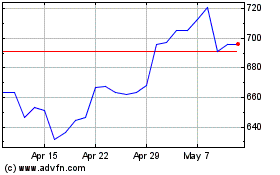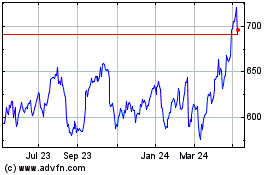HSBC, Santander Signal Cautious Optimism -- 3rd Update
October 27 2020 - 11:57AM
Dow Jones News
By Simon Clark
LONDON -- Global banks are signaling cautious optimism about
weathering the coronavirus pandemic, setting aside less cash to
cover bad loans, posting better-than-expected profits and saying
payouts to shareholders could be around the corner.
Two large international banks struck a hopeful note as they
reported third-quarter earnings Tuesday. London-based, Asia-focused
HSBC Holdings PLC took fewer provisions for bad loans, beat
earnings estimates and said it might pay a conservative dividend.
Banco Santander SA, based in Spain but with big operations in Latin
America, the U.S. and U.K., also lowered its bad-loan charges and
posted better-than-expected profit for the period, saying it was
confident it could resume cash dividends once regulators allow it.
European regulators have told banks to refrain from paying
dividends, fearful they could face capital shortfalls if the
economy deteriorates further.
Ana Botín, Santander's executive chairman, said customers are
recovering more quickly than anticipated from the pandemic shock,
driving its forecast for loan-loss provisions down for the entire
year.
U.S. banks also had a positive third quarter despite the
pandemic and recession, with JPMorgan Chase & Co. reporting a
rise in profit and Citigroup Inc. and Goldman Sachs Group Inc.
delivering better-than-expected results. U.S. regulators have
stopped short of banning banks from paying dividends, imposing caps
for the country's largest lenders.
HSBC Chief Executive Noel Quinn said the bank's results were
promising because of the lower credit losses and strong capital and
liquidity levels. Shares of HSBC and Santander rose.
For all the positive signs, the resilience of banks rests in
large part on massive relief programs from central banks and
governments. Some investors and analysts worry this support has
kept the real extent of problem loans and underlying damage to bank
balance sheets at bay and that a clearer picture will emerge only
when these programs end.
In addition to navigating the coronavirus crisis, HSBC is
embroiled in a political clash between Beijing and Washington over
the status of Hong Kong. When HSBC's top Asia executive endorsed
China's extension of a national-security law to the port city in
June, Secretary of State Mike Pompeo described the act as a "show
of fealty."
"Geopolitical risk, particularly relating to trade and other
tensions between the U.S. and China, remains heightened," HSBC said
Tuesday. "Investor and business sentiment in some sectors in Hong
Kong remains dampened and ongoing tensions could result in an
increasingly fragmented trade and regulatory environment."
HSBC also angered Chinese authorities by sharing information
about telecommunications-equipment company Huawei Technologies Co.
with U.S. prosecutors in 2016. Investors are concerned the bank
could be put on an "unreliable entities" list in China that would
threaten its plans to expand its retail and commercial banking in
the world's most populous nation.
Such a move by Chinese authorities would complicate HSBC's
strategy of refocusing on its Asian heartland, where it makes most
of its profit. Mr. Quinn said in February that he plans to shed 15%
of the bank's 235,000-strong workforce by cutting business lines
and customer relationships in the U.S. and Europe. HSBC was founded
in Hong Kong in 1865 and moved its headquarters to London in the
1990s. HSBC said it employed 230,317 people as of Sept. 30.
HSBC's decadeslong strategy of expanding across Europe, Asia and
the Americas is "defunct," Manus Costello, a banking analyst at
Autonomous in London, wrote in a note in September. "The intention
to generate profits from outside Asia has largely failed."
Mr. Quinn quashed speculation that the renewed focus on Asia may
lead to HSBC's headquarters moving back to Hong Kong.
"We're not intending to review the domicile of the bank," Mr.
Quinn told journalists. "We took that decision a few years ago and
we do not see any reason to revisit that decision."
HSBC is starting a new digital wealth planning and insurance
unit in China called Pinnacle, which will hire between 2,000 and
3,000 employees in the next four years. Pinnacle has obtained a
fintech license in China, a first for a foreign financial
institution in the country, Mr. Quinn said.
Shares of HSBC have fallen 43% this year and recently touched a
25-year low. Many other bank stocks have tumbled as the coronavirus
wreaked economic damage and forced central banks to slash interest
rates, which makes it harder for lenders to earn profit. The Stoxx
Europe 600 Banks index has fallen 39% this year.
The bank said it may pay a "conservative dividend" for 2020 if
regulators permit it. The Bank of England this year told U.K. banks
not to pay dividends to conserve cash during the pandemic.
HSBC set aside $785 million in provisions for bad loans in the
third quarter, less than one-third of the amount set aside in each
of the first and second quarters of 2020.
Ewen Stevenson, HSBC's chief financial officer, said the bank
could add between $500 million and $1 billion in provisions in the
fourth quarter if the U.K. and European Union fail to reach a trade
agreement in the next few weeks.
Write to Simon Clark at simon.clark@wsj.com
(END) Dow Jones Newswires
October 27, 2020 11:42 ET (15:42 GMT)
Copyright (c) 2020 Dow Jones & Company, Inc.
Hsbc (LSE:HSBA)
Historical Stock Chart
From Aug 2024 to Sep 2024

Hsbc (LSE:HSBA)
Historical Stock Chart
From Sep 2023 to Sep 2024
